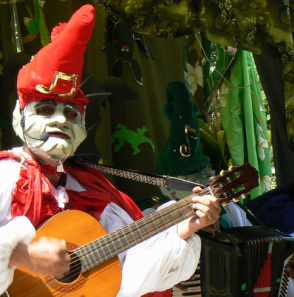 A "gnome" in a social drama about gender equality. A "gnome" in a social drama about gender equality. Day 62 in Ocotal/Mozonte July 28, 2012 A dear friend gave me a copy of The Art of Pilgrimage by Phil Cousineau before I left for Nicaragua. I left it by mistake in the basement of the church where I used to go every Monday evening to be in community with people who inspired me, with whom I felt included and who became my friends. Another dear friend picked up the book for me and made sure to include it with some other things I was collecting on a recent and extravagant 2-day trip to Boston. A long journey for a paper-back book that now sits on the bedside table of my tiny bedroom in Ocotal, Nicaragua. I started reading the book earlier this week, breaking my vow of "Spanish-only" literature to reconnect with something completely familiar - English words on a printed page. Cousineau asks the following: "Are you alive now at home? Are you going to stay in your coffin of mediocrity, [or] break out of your cage, and take a journey to discover this in order to find yourself?" He writes the following of his experience when visiting Egypt for the first time:  A "bad" gnome in the same social drama. A "bad" gnome in the same social drama. "Something ancient and holy was unfolding all around me. It was what the wandering pilgrim-poet Basho called 'a glimpse of the under glimmer,' an experience of the deeply real that lurks everywhere beneath centuries of stereotypes and false images that prevent us from truly seeing other people, other places, other times." He goes on to say that "Pilgrimage is the kind of journeying that marks (the) move from mindless to mindful, souless to soulful travel...by definition it is life-changing." And change is painful and today I feel the pain...a little sad, a little melancholy. I can think of nothing specifically that could have triggered this, but writing feels like the right way to honor the feeling and give it a form that I can witness. Everything is going well. I am doing interesting work that sits right at the intersection of what should make me happy and what the world needs. I teach my first full-day workshop on Monday in Spanish to the small team here at the institute, a pilot for a course I could teach to young leaders in a much longer leadership development program that focuses on "entrepreneurial leadership," something of a buzz-word here at the moment. I was invited to present one of my "m' Mam" stories at a recent gender conference - in Spanish - to an appreciative audience. I have a perfectly charming place to live. I eat well. I have people to connect with. I have work that pays me handsomely for this pilgrimage. I want for nothing. And yet, I yearn to know that what I am doing is not just part of the problem here and elsewhere in the world. That if "Making a Differece" is one of my values, then why do I not feel "At Peace", my highest value (or at least it was when I last checked in, some 6 years ago!)  A sunset in San Juan del Sur. A sunset in San Juan del Sur. I share my life with hundreds, no thousands of little tiny ants - two or three would sit on the head of a pin, if they would sit still long enough. but they don't. They are everywhere and there is nothing to do but accept their presence. In addition to the usual attractions of a food or liquid, they are especially attracted to my MacBook Pro, a feat of modern engineering designed to be as close to perfect as is humanly possible, even down to planned obsolescence so that not only is it reliable (which makes me happy) but I will be inspired to buy a new version when available (which makes shareholders happy). Nothing has been overlooked, except that these little tiny ants will disappear down the "1,!" key to reappear from the "delete" key and walk across and behind the screen to reappear where the screen hinges with the keyboard. What was a charming "difference" in my first few weeks, now bugs the hell out of me, since I can do nothing about it. No amount of cleaning or sanitizing makes my table or the case of my aluminium laptop any less attractive to these tiny, insidious creatures. So I "suffer" and wonder at my sense of annoyance, my frustration, my questioning...this change of perspective. I feel the pain, an ingredient that Cousineau describes as an essential part of any pilgrimage - the component of overcoming difficulties. And like Cousineau, I wonder if there isn't an easier way! 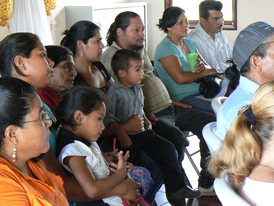 Participants at the workshop on women's rights. Participants at the workshop on women's rights. I think I can trace my "pain" back to a recent workshop on gender equality and the role of women in Nicaraguan society. The day-long workshop ws examining the progress made in women's rights since the introduction of equality laws some 13 years ago. In classical workshop style, a group of 100+ participants had broken out to brainstorm and capture among themselves changes in the last 13 years, noting successes and failures. Four or five groups of some 20 or so people. Groups in Nicaragua are never an exact number. People wander in and out to feed children, change diapers, take phone calls, make phone calls or for any other one of a hundred more important reasons. It feels a little like a street market on a Saturday morning. One person presents their group's ideas, occasionally refering to a butcher-block paper taped to a window or a wall (there are no flip chart stands in the institute), but generally not, tending instead to talk off or around the topic. Given access to a microphone, people love to talk...though few seldom listen. An official from one of the local small towns, stands to position himself as the group's spokesperson, a perfect opportunity to further a political career: an audience of a 100+ and a microphone! As he winds down his canned (but sadly unedited) rhetoric, he graciously introduces an old and indigenously beautiful community leader, elected by the people of her community to represent the voice of the people. She nervously takes the microphone, something she would never have done a few years before and starts to talk. This is clearly progress, and yet... 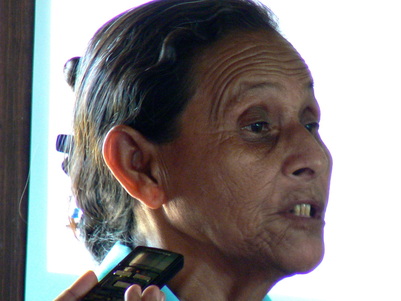 An indigenous community leader. An indigenous community leader. The official chooses to stand up front and center, just to the side of the woman - not taking a seat among the audience - reluctant to release his power position in front of the people. Shortly after she begins, he receives a phone call on his smart phone (price tag $350, what the woman will earn in 2 or 3 weeks.) He takes the call and spends 3 minutes or so talking to person on the other end as though there was no one else in the room. Hanging up, he dials another number and begins another 3-minute call, oblivious to his presence during the woman's presentation. Neither the woman, the audience, the facilitators nor any one of her group seemed disturbed by this act of disrespect. Having just spoken at length about the rights of women and the need for respect in gender balance, he had negated every one of his words with the simple act of receiving and making calls. Was I the only person that noticed this? Was it my own cultural bias that was getting in the way? And why was it bugging the hell out of me (and still does more than 2 weeks later)? And so I got to thinking, and it stirkes me that this seemingly unremarkable experience lies at the heart of my current struggle. Clearly the institute here in Mozonte does incredibly important work, does it with a sense of dedication that is impressive, with few resources and against some pretty stiff political, economical and cultural challenges. And...it struggles like any training organization with the challenge of "making training stick" - of getting the new skills transfered into the workplace (to use corporate jargon). Even making a huge allowance for my own US-corporate-ROI-timeline-influenced bias and my own lack of patience, it looks to me as though there is still room for improvement moving theory to action, as displayed by the official's behavior at the end of this day-long worshop.  Words are mere bubbles of water... Words are mere bubbles of water... There is an old Chinese (or Tibetan) saying: "Word are mere bubbles of water, while actions are drops of gold." In my brief time here in Mozonte and with the few workshops I have witnessed, I have come to the conclusion (which I am ready to have challenged) that there are four components to the learning cycle that I have observed (which I suspect are universal, to some extent or other). And for sure, none of what I am about to say is radically new to learning specialists. The four components are:
So...what I think I am questioning is how not to become part of the systemic problem that exists in this (and I suspect other countries on a development path) - i.e. how best to convert effort into output - bubbles of water into drops of gold - words into action. I have never been exposed to so many studies, investigations, books, documentation, forms and analysises done of problems, communities and what they need. There is no shortage of money and time spent in these activities. I see lots of well-meaning and probably mostly excellent training and "help" being delivered by everyone from established institutes such as this, to "Jesus Teams" coming in from around the world in expensively branded T-shirts worn by terribly enthusiastic young people chaperoned by their role model parents and teachers. And I see slow, desparately slow progress (if any) towards self-sufficiency and sustainability. Just thinking about my choice to involve myself in this "pilgrimage" and that my work are just another component of the same fruitless paradigm is unbelievably depressing. 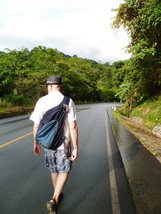 I know that our realizations, feelings and emotions are influenced by our point of view - the frame we take to consider things. But boy, at this phase of my experiencing here in Ocotal/Mozonte, it's hard to find a point of view that buoys me up and brings me joy, to know what to do, where to turn. And so I throw my trust to the experience of other pilgrims and the words of Phil Cousineau: “Centuries of travel suggest that when we no longer know where to turn, our real journey has just begun.” Still knowing and accepting this heady possibility, I chose not to fulfill his other prophecy: "What every traveler confronts sooner or later is that the way we spend each day of our travel...is the way we spend our lives." Ooy vey!
0 Comments
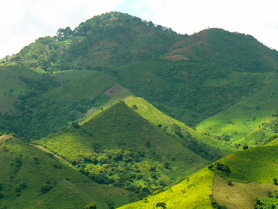 "God's country" - Quilali, Nicaragua Day 40 in Ocotal (and Monzonte) July 6, 2012 Driving back from Quilali, returning from a visit this week to meet with the group of leaders I had met on a previous visit, I snapped the photo to the left. I have described it as "God's country", not because I am religious (far from it - I wobble between agnosticism and atheism, depending on the rhetoric and volume of the religious spokesperson of the day featured in the news) but because I could think of no secular word that hasn't been over-used to describe the majesty and beauty of the hills around this small, remote town. God's country! And it's not lost on me that I am writing this on my 40th day living in Ocotal (and volunteering in Mozonte) - a significant day in the Christian and Muslim faiths. Generally accepted to mean simply "a long time" when the story-teller wasn't sure of the exact length of time, the number "40" is also recognized as being a period of "probation or trial". Noah's Flood, Moses on the mountain, the Israelites wandering in the wilderness during their exodus, Jesus wandering in the wilderness after his baptism and other references in the Bible all point to a period of 40 days. In the Quran, men are only thought to be fully grown and mentally mature after the age of 40 and Muhammad received his first revelation from the angel Gabriel when he was 40. So at my 40-day probationary self-evaluation: where am I, what have I achieved, what have I learned, what have I contributed. One of the strange things about being a "volunteer" is that no-one seems to evaluate my work (at least not formally - I have no doubt there are some "water-cooler" conversations - not that anything close to a water-cooler even exists in the institute). But before I go on, let me tell you a story... 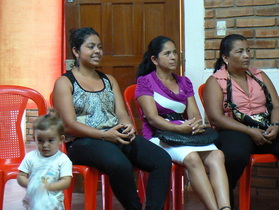 Community leaders (and dependents!) in Quilali It's a perfect, sunny day in what is usually the rainy season but despite the sun, the air is cool due to the height at which Quilali is situated and the breezes gently bring the scent of wood-burning stoves up the hill to where we are working. It couldn't get much better. We are in the meeting room of the town hall again, meeting with 12 community leaders to complete their training in "How To Conduct a Social Audit" - a form of citizenship training designed to hold the local municipality accountable for their promises to complete projects included in their annual budget. The group have completed a social audit of the installation of a potable water supply to one section of the town - some 20 years in the making and at last finished. The session is tedious as the facilitator pulls the information out of the group to complete a form that summarizes the social audit that is to be presented the following morning to the town council. Mostly completing the form for them, she drags the reluctant comments out 4-5 people in the group of 12. The others sit by listening, feeding babies, texting or talking amongst themselves. I detest group-writing projects in any setting and I struggle to stay even partially present. My mind wanders off on a journey that analyzes and finds fault in everything with the session. When I am asked a question by the facilitator to bring me into her role, not only do I not understand the question (my brain has been working in English and the switches don't move too fast!) but I don't even hear it. I am one sour and reluctant participant. 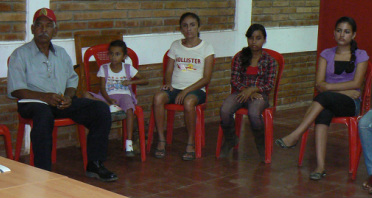 Community leaders (and dependents) in Quilali The session comes to an end with the usual meal of chicken, rice, beans and fried plantains - and there are some comments from the participants about the value of training, how much it has helped, how it has moved the project forward, how they feel more confident, about their ability to speak up. I am not convinced...still mired in some theoretical paradigm of the perfectly designed training session. We get back in the pick-up for the homeward journey. We are loaded up with bags of locally grown, roasted and ground coffee, a live chicken tied in the back (shortly to become soup for the facilitator), bunches of plantains and bananas - all a third of the price up here in this rural town of about 17,000 people. And the facilitator turns to me in the car with a smile about a mile wide, beaming with the success of the session. She hands me a fresh tortilla (thicker and less-uniform than those we find in the US), with the smell of smoke from the wood-fired stove where they were cooked, and a hunk of fresh cheese, made that morning - white, salty and different. She calls her colleague in the institute and glows as she tells her of the outcome, both agreeing that this should be used in the future as a case study for why their methodology works. She is clearly pleased. I turn to look out of the window and snap another photo of God's country, realizing that I was missing the point, that I had missed the point all the way through the morning, that I had failed to change my lens. 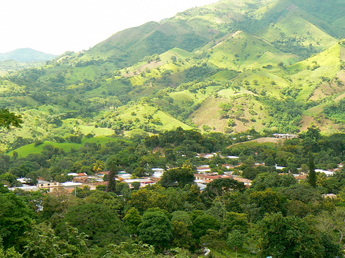 The town of Quilali among the hills of Las Segovias So where am I, what have I achieved, what have I learned, what have I contributed. And more to the point, how do I learn to change my lens while still staying focused on what I can bring to the table? At my 40-day probation, I continue to vascillate. Between moments of serenity and presence when I slow down, breath, see and hear what's around me and discover a sense of the possibilities for what I can and I am doing here. And moments when I wonder if I will ever really speak Spanish, if I am making a scrap of difference, if it even matters. Part of the problem is the context in which I am volunteering at the institute. Working in a country that survives on volunteer efforts, subsidies, discounted oil, handouts by the ship load, "Jesus teams" from the US and a revolving door of people coming in to do good, help, make a difference and learn something along the way. My in-the-moment thoughts (which are almost never the most reasoned or balanced) are that the people coming to help actually take away more than they leave behind, in terms of their own growth, photos, entries in blogs, stories and an education in how to look at the world, colonization and US/world politics through the lens of this poor, tiny country. And not only do they leave richer, but they leave the country even more co-dependent than when they arrived. This, I was told today by a 23 year old Peace corps volunteer, is at the heart of the challenge of "aid": how to give it, how to administer it, how to measure it's effectiveness. Sadly, our conversation was not untypical of a conversation with someone 30 years younger than myself: short on depth, partially connected, competing for her attention with her laptop, her Email and her connection to the digital world. In fairness, she only occasionally gets access to any Internet, so this was a luxury and I should have appreciated this or negotiated our time better. But what I was aching for was an answer, a connection between my energy, the real world I have placed myself in and an outcome I could embrace. What I was left with was a feeling of melancholy, questions and a greater sense of disconnection. And I know, this too shall pass. But for the moment, I honor the questions and feelings until they pass. |
BackgroundI sold house, car and most of my furniture to move to the small town of Ocotal in Las Segovias on the Honduras/ Nicaragua border. Archives
March 2014
Categories |
Contact© Copyright 2018 Richard Richards, Bournemouth, Dorset, UK
|

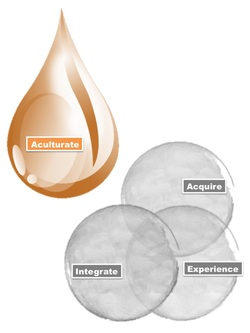
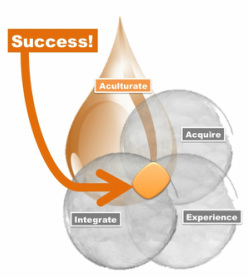
 RSS Feed
RSS Feed
